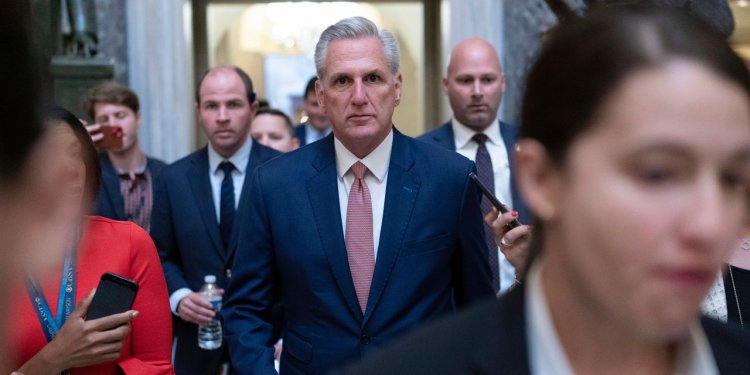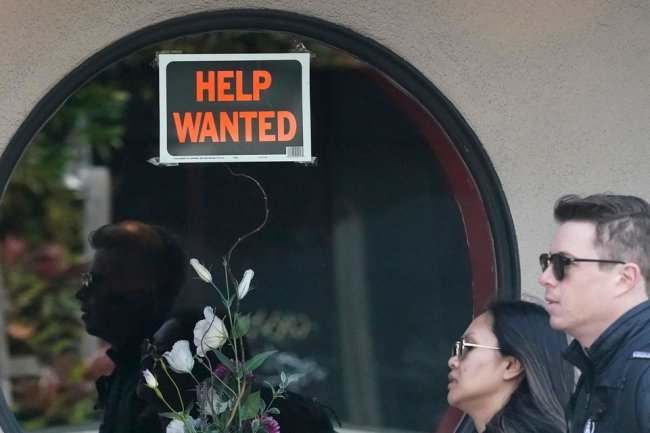Debt-Ceiling Deal Faces Vote in House
President Biden and House Speaker Kevin McCarthy reached an agreement to raise the debt ceiling. WSJ’s David Harrison breaks down what to know about the deal and its path through Congress. Photo illustration: Kaitlyn Wang By Natalie Andrews and Siobhan Hughes May 31, 2023 11:00 am ET WASHINGTON—The carefully negotiated bill to raise the debt ceiling while cutting spending is expected to be voted on by the House of Representatives on Wednesday, a major step toward averting a potential default by the federal government ne


President Biden and House Speaker Kevin McCarthy reached an agreement to raise the debt ceiling. WSJ’s David Harrison breaks down what to know about the deal and its path through Congress. Photo illustration: Kaitlyn Wang
WASHINGTON—The carefully negotiated bill to raise the debt ceiling while cutting spending is expected to be voted on by the House of Representatives on Wednesday, a major step toward averting a potential default by the federal government next month.
The measure appeared on track to pass though the House with a combination of Republican and Democratic votes, though continued Republican defections added some drama to the proceedings. House GOP leaders said they expect more than half of the 222 Republicans in the chamber to support the package, while many of the 213 Democrats are also likely to back the bill, giving the measure the majority needed to pass.
“We’re trying to get as many votes as we can,” said House Speaker Kevin McCarthy (R., Calif.), who could see his speakership come under pressure if he isn’t able to shore up GOP support.
Newsletter Sign-Up
WSJ Politics & Policy
Scoops, analysis and insights driving Washington from the WSJ's D.C. bureau.
Subscribe NowThe package advanced past a closely watched procedural hurdle in the Rules Committee late Tuesday. The first signal of broader support for the legislation Wednesday will be a late-afternoon procedural vote. Typically, members signal how they will vote for final passage of the bill when they vote for the rule. A final House vote is expected as soon as Wednesday night.
The legislation, if approved in the House, would then move to the Senate, where leaders have said they want to move quickly to approve the bill. Senate Democrats and Republicans will meet behind closed doors on Wednesday for their weekly policy lunches.
Treasury Secretary Janet Yellen has said the government could run out of the cash it needs to pay its bills on time on June 5 unless Congress acts. On Tuesday, the White House urged Congress to pass the bill “as soon as possible to protect the full faith and credit of the United States.”

Kevin McCarthy’s speakership might be under pressure if he fails to shore up GOP support for passing the debt-ceiling legislation in the House of Representatives.
Photo: Jose Luis Magana/Associated Press
Some Senate Republicans who have threatened to slow passage said they would agree to cut through procedural hurdles if they were granted amendment votes. Sens. Rand Paul (R., Ky.) and Mike Lee (R., Utah) have said that they will need amendment votes if they are to consent to speeding up passage of the debt-ceiling deal. Without such a consent agreement, final passage could be delayed until Tuesday, June 6.
The debt-ceiling deal is the product of weeks of negotiations between House Republicans and the White House. The bill would suspend the debt ceiling through Jan. 1, 2025, with the limit resetting on Jan. 2 to the amount incurred to that point. It tees up the next battle over the debt ceiling for after the 2024 presidential election.
The bill would cut spending on domestic priorities favored by Democrats in fiscal 2024, while boosting military spending by about 3%. It then sets a 1% cap on spending increases for the 2025 fiscal year. The bill also extends limits on food assistance to able-bodied, low-income adults without dependents to people ages 50 to 54, up from the current top age of 49, to prod them to find jobs, while expanding benefits for others. A provision in the bill would speed up environmental reviews for energy projects.
The legislation would reduce government deficits by about $1.5 trillion over a decade compared with the baseline forecast, according to the Congressional Budget Office. Most of that reduction, roughly $1.3 trillion, would come from the caps on spending.
Several House Republicans voiced support for the deal, even if it didn’t provide everything they wanted. “We’ll make it work,” said Rep. Ken Calvert (R., Calif.), the chairman of the House Appropriations Committee’s defense subcommittee. “It won’t be pretty, but we’ll get it done.”

Rep. Thomas Massie (R., Ky.), who sits on the House Rules Committee, on Tuesday backed sending the debt-ceiling legislation to the floor.
Photo: Drew Angerer/Getty Images
The deal is based on some side agreements that aren’t embedded in the legislative text but that form the basis of the understanding between President Biden and McCarthy. Among those is an agreement to provide $121 billion for veterans’ medical care in fiscal 2024—a dollar amount that doesn’t show up in the text.
“I don’t think anyone wants to cut VA benefits,” said Rep.
Some Republicans said they were brought into the “yes” column largely because of a provision in the bill highlighted by Rep. Thomas Massie (R., Ky.) to push Congress to enact all 12 traditional appropriations bills or face a penalty under which the government would be funded through a continuing resolution, but at 99% of the prior year’s funding levels.
“That’s a win,” said Rep. Marjorie Taylor Greene (R., Ga.) “To me, that is a really big piece and it’s a positive thing in the bill.” She said she was getting there in terms of being able to vote yes, but had asked McCarthy for “some sides and some dessert,” such as a vote on impeaching a Biden administration official or a measure to balance the budget.
SHARE YOUR THOUGHTS
How would you rate the performance by Congressional leaders when it comes to the debt ceiling? Join the conversation below.
Some Democrats said they would support the deal because constituents were worried that they wouldn’t receive government benefits if the U.S. ran out of money to pay its bills. Many progressives are upset that the bill curbs spending for domestic programs, as well as provisions that take funding away from the Internal Revenue Service and change work requirements for food stamps.
“The folks who are on whether it’s Social Security or whatever the benefits were, they’re very concerned about not getting their check,” said Rep. Glenn Ivey (D., Md.). He added that he went into details about the bill at some events, and voters told him “‘Look, man, just get it done. I want my check.”
Write to Natalie Andrews at [email protected] and Siobhan Hughes at [email protected]

What's Your Reaction?

















